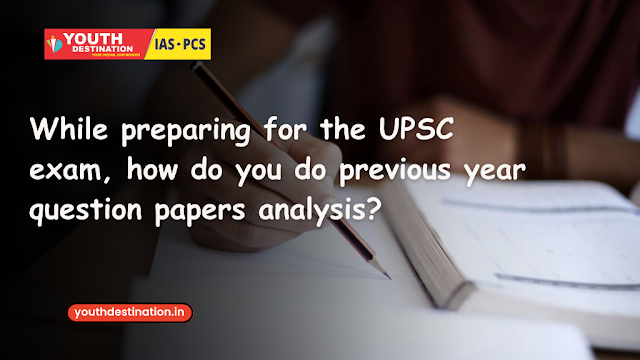This article aims to provide insights into
how you can effectively analyze and utilize previous year question papers
during your UPSC exam preparation. Preparing for the UPSC exam can be a
challenging and demanding task. One effective strategy to enhance your
preparation is to analyze previous year question papers.
1. Importance of Previous Year Question Papers Analysis
Analyzing previous year question papers is crucial for several
reasons. It helps you understand the exam pattern, identify trending topics,
recognize question types and weightage, identify knowledge gaps, and develop
effective exam strategies. It also aids in improving time management, enhancing
speed, and practicing answer writing. Moreover, analyzing previous year
question papers gives you a realistic view of the exam and boosts your
confidence.
2. Understanding Exam Pattern and Syllabus
Before delving into previous year question papers, it is
essential to have a thorough understanding of the UPSC exam pattern and
syllabus. Familiarize yourself with the different stages of the exam, such as
the Preliminary Examination and the Main Examination. Study the syllabus in
detail and identify the areas that require more focus and preparation.
3. Identifying Trending Topics
While analyzing previous year question papers, pay attention to
the topics that frequently appear in the exams. These trending topics indicate
their significance and the likelihood of their inclusion in future exams. Make
a note of these topics and prioritize your study plan accordingly.
4. Analyzing Question Types and Weightage
Carefully analyze the types of questions asked in the previous
year's papers. Identify whether the questions are factual, conceptual, or
analytical in nature. Additionally, take note of the weightage given to
different topics. This analysis will help you understand the question pattern
and allocate your time and efforts accordingly.
5. Identifying Knowledge Gaps
While solving previous year question papers, you may encounter
questions that you are unable to answer. Use these instances as an opportunity
to identify your knowledge gaps. Make a note of the topics or subjects where
you struggle and focus on improving your understanding in those areas.
6. Time Management and Speed Enhancement
One of the key aspects of UPSC exam preparation is time
management. Analyzing previous year question papers allows you to gauge the
time required to solve different types of questions. It helps you develop
strategies to improve your speed and accuracy, ensuring that you complete the
exam within the given time frame.
7. Developing Exam Strategies
Previous year question papers provide valuable insights into the
exam patterns and trends. Analyzing them helps you develop effective exam
strategies. You can identify the areas where you need to allocate more time and
those where you can save time. This analysis enables you to approach the exam
with a well-defined plan and enhances your overall performance.
8. Practicing Answer Writing
Answer writing is an essential skill for UPSC exam preparation.
By analyzing previous year question papers, you can practice writing answers
within the given time constraints. Pay attention to the structure, clarity, and
coherence of your answers. Practice expressing your thoughts concisely and
effectively, ensuring that your answers are well-structured and address the
specific requirements of each question.
9. Mock Tests and Self-Assessment
Incorporate mock tests into your study routine. Mock tests
simulate the actual exam environment and help you assess your preparedness. Use
previous year question papers as a resource for creating mock tests. Time
yourself while attempting the questions and evaluate your performance. This
process will enable you to identify your strengths and weaknesses and focus on
areas that require improvement.
10. Revision and Consolidation
Analyzing previous year question papers aids in revision and
consolidation of your knowledge. As you review the questions and answers,
reinforce the concepts and information you have learned. Use the question
papers as a reference to revise important topics and ensure that you have a
comprehensive understanding of the subjects.
11. Seeking Guidance and Expert Advice
While analyzing previous year question papers, you may come across
complex or challenging questions. Seek guidance from subject matter experts,
mentors, or teachers to clarify your doubts. Discuss the solutions and
approaches with them to gain deeper insights and enhance your problem-solving
abilities.
12. Maintaining a Positive Mindset
Preparing for the UPSC exam can be mentally and emotionally
demanding. While analyzing previous year question papers, it is important to
maintain a positive mindset. Treat each question paper as an opportunity to
learn and grow. Celebrate your achievements and milestones, and stay motivated
throughout your preparation journey.
13. Utilizing Online Resources
In the digital age, there is a wealth of online resources
available for UPSC exam preparation. Along with previous year question papers,
explore reputable websites, educational platforms, and forums that provide
additional study materials, tips, and guidance. Make use of these resources to
supplement your preparation and stay updated with current affairs and recent
developments.
Conclusion
Analyzing previous year question papers is a valuable strategy
for UPSC exam preparation. It helps you understand the exam pattern, identify
trending topics, recognize question types and weightage, and develop effective
exam strategies. By utilizing these papers, you can enhance your time
management skills, practice answer writing, and bridge knowledge gaps. Remember
to approach the analysis with a positive mindset and seek guidance when needed.
With consistent practice and focused preparation, you can increase your chances
of success in the UPSC exam. Click for more about Best IAS Coaching in Delhi.
Best
of luck on your UPSC journey!



.png)
















0 Comments